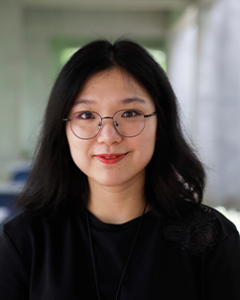Reflecting INFO’s ongoing dedication to excellence in research, education, and the exploration of the information science landscape

Aerial view of Hornbake Library. ©John Consoli/University of Maryland
The University of Maryland College of Information (INFO) is proud to welcome a cohort of seven scholars and practitioners to our faculty. These new members deepen our expertise in critical, forward-looking domains such as artificial intelligence policy, computational sociolinguistics, civic technology, and inclusive data visualization.
Their collective work—spanning government advisory, award-winning computational research, and community advocacy—embodies our commitment to understanding and shaping the role of information in society. We are excited to see how their diverse perspective will innovate our curriculum, advance our research, and inspire the next generation of information professionals.
Meet the new faculty members:
 Ms. Lee Tiedrich is a visiting professor of the practice at INFO. She is an AIM fellow and co-director of the Tech Policy, Research & Education Hub. She is a globally recognized expert in AI and emerging technologies. She leverages decades of experience, including as a partner at Covington & Burling LLP, to help organizations implement strategies that maximize benefits and manage risks. Tiedrich holds key advisory roles, serving as a Senior AI Advisor to the US National Institute of Standards and Technology (NIST) and contributing to pivotal international efforts. She is a lead author for the OECD on AI policy and a Senior Adviser to the UK-government-funded International Scientific Report on Advanced AI Safety. She also co-chairs two expert committees for the Global Partnership on AI (GPAI). Holding electrical engineering and law degrees, she is a frequent speaker at premier global institutions and is recognized for her work at the intersection of technology, policy, and law. She joins us from Duke University and previously taught at the University of Pennsylvania Law School.
Ms. Lee Tiedrich is a visiting professor of the practice at INFO. She is an AIM fellow and co-director of the Tech Policy, Research & Education Hub. She is a globally recognized expert in AI and emerging technologies. She leverages decades of experience, including as a partner at Covington & Burling LLP, to help organizations implement strategies that maximize benefits and manage risks. Tiedrich holds key advisory roles, serving as a Senior AI Advisor to the US National Institute of Standards and Technology (NIST) and contributing to pivotal international efforts. She is a lead author for the OECD on AI policy and a Senior Adviser to the UK-government-funded International Scientific Report on Advanced AI Safety. She also co-chairs two expert committees for the Global Partnership on AI (GPAI). Holding electrical engineering and law degrees, she is a frequent speaker at premier global institutions and is recognized for her work at the intersection of technology, policy, and law. She joins us from Duke University and previously taught at the University of Pennsylvania Law School.
 Dr. Julia Mendelsohn is an assistant professor at the INFO and UMIACS, and is affiliated with AIM and the Department of Government and Politics. Her research interests include natural language processing, political communication, and computational sociolinguistics. She is especially interested in developing computational models for understanding subtle and covert rhetoric in online political discussions and the impact of such language, particularly on marginalized communities. Dr. Mendelsohn has published papers at top-tier natural language processing and computational social science venues, including ACL, NAACL, EMNLP, and ICWSM, where she received the Outstanding Methodology award in 2023. Mendelsohn was previously a postdoctoral scholar at the University of Chicago Data Science Institute, completed her PhD at the University of Michigan School of Information, and received a BA in Linguistics and MS in Computer Science from Stanford University.
Dr. Julia Mendelsohn is an assistant professor at the INFO and UMIACS, and is affiliated with AIM and the Department of Government and Politics. Her research interests include natural language processing, political communication, and computational sociolinguistics. She is especially interested in developing computational models for understanding subtle and covert rhetoric in online political discussions and the impact of such language, particularly on marginalized communities. Dr. Mendelsohn has published papers at top-tier natural language processing and computational social science venues, including ACL, NAACL, EMNLP, and ICWSM, where she received the Outstanding Methodology award in 2023. Mendelsohn was previously a postdoctoral scholar at the University of Chicago Data Science Institute, completed her PhD at the University of Michigan School of Information, and received a BA in Linguistics and MS in Computer Science from Stanford University.
 Dr. Masha Krupenkin is an INFO assistant professor. Her research uses survey and computational methodologies to study Americans’ political behaviors on a variety of topics, including racial prejudice, immigration, and partisanship. Prior to coming to UMD, she was an assistant professor of political science at Boston College. Krupenkin has also been a faculty fellow at Princeton CSDP and a visiting scholar at Microsoft Research.
Dr. Masha Krupenkin is an INFO assistant professor. Her research uses survey and computational methodologies to study Americans’ political behaviors on a variety of topics, including racial prejudice, immigration, and partisanship. Prior to coming to UMD, she was an assistant professor of political science at Boston College. Krupenkin has also been a faculty fellow at Princeton CSDP and a visiting scholar at Microsoft Research.

Dr. Samantha McDonald is a lecturer at INFO. She is a civic technology researcher specializing in the design of communication systems that support representative and deliberative democracy. She earned her PhD in informatics from the University of California, Irvine, and has worked as a consultant for congressional technology companies and a UX researcher at Meta. In addition to her industry and academic work, she spent the last two years as a civic advocate for affordable housing and public recreational access in the California tidelands, where she lived aboard her sailboat with her partner.
Dr. Sarah Lee is a visiting senior lecturer at INFO, focusing on data analysis and data science. Initially trained as a marine ecologist, Dr. Lee has been teaching undergraduates full time since 2012, including 5 years teaching statistics to biologists. Dr. Lee enjoys finding new ways to make learning statistics accessible and enjoyable and looks forward to working with INFO students. She has a PhD in marine science from the University of North Carolina at Chapel Hill. She previously worked as a postdoctoral scholar at Hopkins Marine Station, an assistant professor of biology at Stanford University, an assistant professor of biology at DePauw University, and an associate professor of instruction in integrative biology at University of South Florida.
is a visiting senior lecturer at INFO, focusing on data analysis and data science. Initially trained as a marine ecologist, Dr. Lee has been teaching undergraduates full time since 2012, including 5 years teaching statistics to biologists. Dr. Lee enjoys finding new ways to make learning statistics accessible and enjoyable and looks forward to working with INFO students. She has a PhD in marine science from the University of North Carolina at Chapel Hill. She previously worked as a postdoctoral scholar at Hopkins Marine Station, an assistant professor of biology at Stanford University, an assistant professor of biology at DePauw University, and an associate professor of instruction in integrative biology at University of South Florida.
 Dr. Keke Wu is an INFO assistant professor. She is a researcher and storyteller working to bridge data and lived experience through visualization. She helped establish the subfield of cognitively accessible visualization and continues to reimagine how data can be inclusive, expressive, and actionable for diverse audiences. With a background in computer science, cinematic arts, and media design, she leverages storytelling, aesthetics, and creative technology to foster understanding, emotional connection, and social impact through data. She received her PhD in computer science from the University of North Carolina at Chapel Hill and worked as a postdoctoral researcher at Emory University. She now leads the Lived Data Collective, a research group dedicated to transforming how data is experienced and understood. Her work has been published in leading venues including ACM CHI, IEEE VIS, and ACM ASSETS, and was honored with a Best Paper Award at CHI 2021 for advancing inclusive and impactful visualization design. She has a PhD in computer science from the University of North Carolina at Chapel Hill. She previously worked as a postdoctoral fellow in computer science at Emory University and a research intern at the Coleman Institute for Cognitive Disabilities.
Dr. Keke Wu is an INFO assistant professor. She is a researcher and storyteller working to bridge data and lived experience through visualization. She helped establish the subfield of cognitively accessible visualization and continues to reimagine how data can be inclusive, expressive, and actionable for diverse audiences. With a background in computer science, cinematic arts, and media design, she leverages storytelling, aesthetics, and creative technology to foster understanding, emotional connection, and social impact through data. She received her PhD in computer science from the University of North Carolina at Chapel Hill and worked as a postdoctoral researcher at Emory University. She now leads the Lived Data Collective, a research group dedicated to transforming how data is experienced and understood. Her work has been published in leading venues including ACM CHI, IEEE VIS, and ACM ASSETS, and was honored with a Best Paper Award at CHI 2021 for advancing inclusive and impactful visualization design. She has a PhD in computer science from the University of North Carolina at Chapel Hill. She previously worked as a postdoctoral fellow in computer science at Emory University and a research intern at the Coleman Institute for Cognitive Disabilities.
 Dr. Yiwei Xu is an INFO assistant professor. She conducts research at the intersection of human-centered AI, information behaviors, and health. Her current work examines the social and psychological impacts of generative AI, including its role in shaping user information seeking and processing, as well as in amplifying strategic information campaigns and influencing public attitudes and beliefs. She conducts experiments, surveys, and content analyses by incorporating computational methods. Her work appears in venues such as PNAS Nexus, Health Communication, Political Communication, International Journal of Communication, Milbank Quarterly, AAAI ICWSM, etc. Her research has received grants from the National Science Foundation and she has received prestigious paper awards from the International Communication Association. Xu received her PhD in communication from Cornell University and her postdoctoral training from the Center for an Informed Public at the University of Washington Information School.
Dr. Yiwei Xu is an INFO assistant professor. She conducts research at the intersection of human-centered AI, information behaviors, and health. Her current work examines the social and psychological impacts of generative AI, including its role in shaping user information seeking and processing, as well as in amplifying strategic information campaigns and influencing public attitudes and beliefs. She conducts experiments, surveys, and content analyses by incorporating computational methods. Her work appears in venues such as PNAS Nexus, Health Communication, Political Communication, International Journal of Communication, Milbank Quarterly, AAAI ICWSM, etc. Her research has received grants from the National Science Foundation and she has received prestigious paper awards from the International Communication Association. Xu received her PhD in communication from Cornell University and her postdoctoral training from the Center for an Informed Public at the University of Washington Information School.